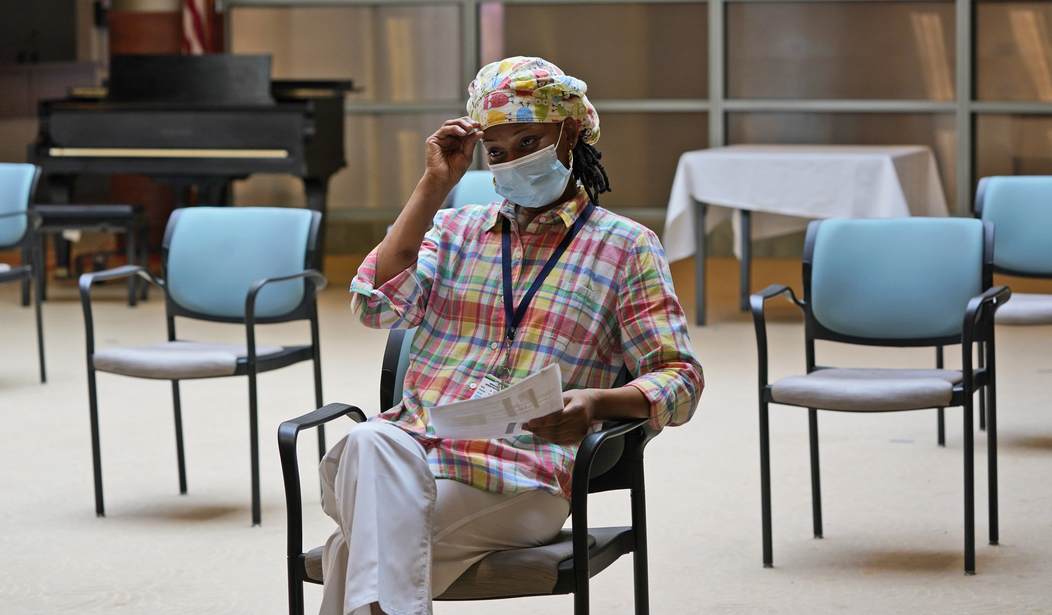The trouble with writing about the emergence of a new variant in an age of instant news is that it’ll take two weeks for scientists to draw any firm conclusions and that’s two weeks too long. We want to know now. Each new scrap of anecdotal information is a tile in a mosaic, and intuitively you expect that as you arrange the tiles a larger picture of what the variant is and how dangerous it may be will take shape.
But in reality, all we’re looking at for now is a haphazard blob of tiles.
Here’s a new tile from the Wall Street Journal. Does this get us any closer to a coherent picture or no?
The emergence of the Omicron variant of the coronavirus in South Africa has driven a sharp increase in Covid-19 hospitalizations in the country’s hot-spot province over the past two weeks, although fewer patients are being treated for severe disease than in previous surges, the country’s National Institute for Communicable Diseases said…
The average number of people admitted to hospital with Covid-19 a day in Gauteng province—home to both Pretoria and the economic capital, Johannesburg—jumped to 49 during the two weeks ended Nov. 27, according to the NICD data. In the previous two weeks, the average daily number of Covid-19 admissions was 18. The number of daily deaths hasn’t changed, the data showed…
Dr. Jassat said around a fourth of patients admitted with Covid-19 in Gauteng were vaccinated.
South African doctors have spent the past few days assuring us that the symptoms they’ve seen in patients so far are mild. How does that tile fit with this one showing a surge in hospitalizations in Gauteng, where the variant first started to become prevalent?
Also, does Omicron only seem mild because it’s mostly young adults who’ve been infected so far? They have strong immune systems; older patients might not fare as well. But what about the fact, as the Journal notes, that young adults are the least likely to be vaccinated? Maybe the Omicron patients in Gauteng would have shaken off infection if they’d had their shots. Although, in that case, how to explain that apparently a quarter of hospitalized patients have been vaccinated?
On the one hand, the rise in hospitalizations so far has been in line with other waves of COVID in South Africa. It’s nothing special. On the other hand, it’s still so early and the number of hospitalized patients is still so small that it’s impossible to tell how bad it might get.
See what I mean about the mosaic looking like a blob?
Here’s an ominous note from the Journal, though: “One thing that stood out to the specialists examining the data was the unusually high number of very young children who have been admitted to hospital.” This from the NYT on the vaccines’ chances against Omicron is ominous too:
“Based on lots of work people have done on other variants and other mutations, we can be pretty confident these mutations are going to cause an appreciable drop in antibody neutralization,” Dr. Bloom said, referring to the body’s ability to attack an invading virus.
South African doctors are seeing an increase in reinfections in people who already had a bout of Covid-19, suggesting that the variant can overcome natural immunity, said Dr. Richard Lessells, an infectious diseases physician at the University of KwaZulu-Natal.
If it’s true that the variant is better than its predecessors at punching through immunity and if it’s also true that it’s more transmissible than Delta, that’s obviously a variant that’s going to spread with lightning speed. South African scientists said earlier today that they do suspect Omicron is the most transmissible version of the virus so far, with cases nationally expected to triple from 3,000 on Saturday to 10,000 by the end of the week. Which is not a disaster if the symptoms are as mild as the earliest cases suggest. On the contrary, the world would benefit from having a less virulent variant out-compete a more dangerous one like Delta. Angelique Coetzee, one of the first South African doctors to treat Omicron patients, is urging people to chill out:
“It may be it’s highly transmissible, but so far the cases we are seeing are extremely mild,” she told reporters. In fact, there’s no certainty that it’s highly transmissible. Virologist Trevor Bedford made the case this morning that the many mutations on Omicron’s spike protein don’t necessarily mean that it’s more fit overall than Delta is:
However, given that Omicron lacks so many of the non-spike mutations that have seemed to contribute to Delta’s increased fitness (https://t.co/wLZEGa8viy), I wouldn’t be surprised if its intrinsic transmissibility is similar to Gamma, etc… as shown here. 5/15 pic.twitter.com/8iNChOYuYX
— Trevor Bedford (@trvrb) November 29, 2021
But if it’s true that Omicron can dodge immunity more easily than Delta can then Omicron wouldn’t need to spread as quickly as Delta does to infect more people:
This plots Rt as a function of intrinsic transmissibility and immune escape. With high levels of population immunity, a hypothetical Omicron virus with modest R0 but partial immune escape will spread faster than a Delta-like virus with high R0 but little immune escape. 9/15 pic.twitter.com/Aa0S1YJRzb
— Trevor Bedford (@trvrb) November 29, 2021
Lotta tiles in the mosaic here. The thing to watch this week as we wait for the pros to draw conclusions is how quickly South Africa’s cases rise; if there’s a freakishly steep spike, that’s obviously strong circumstantial evidence that Omicron really is super-transmissible. And if it is, that means we have a problem unless the variant also proves to be less virulent than Delta.







Join the conversation as a VIP Member